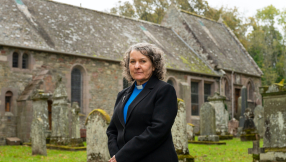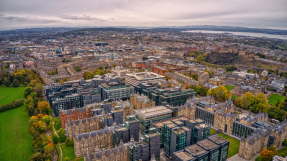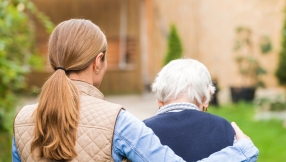
This winter, millions of people will be making difficult choices about their heating and eating as the cost of living crisis continues to make life difficult. The Warm Welcome campaign has been launched to help people through the cold winter months by making sure communities have spaces where people can come in to warm up free of charge.
There are now 3,679 warm spaces open across the UK, ranging from community spaces and libraries, to hairdressers and local authority buildings.
Churches account for almost half of all the Warm Welcome spaces currently open nationwide (1,785) and a survey by the national campaign found that nearly two thirds of churches (61%) are opening their warm spaces more than they did over Christmas in previous years, and over one in 10 (13%) are offering an additional warm space beyond their normal service on Christmas Day.
Sim Dendy is Senior Leader of Freedom Church in Romsey, which is hosting one of the warm spaces in the Hampshire market town. He speaks to Christian Today about why he wanted to be part of the Warm Welcome campaign and how it is doing so much more than keeping people warm.
CT: Are you seeing the cost of living crisis biting locally where you are?
SD: Yes, it's affecting everybody. If at the beginning of the year you had nothing to live on, you've now got less than nothing. If you had a little to live on, you now have nothing. If you had something to live on you now have very little and if you had plenty you've now got a bit less. It's affecting everyone in some way and we're all asking ourselves whether we should buy this or that. I've heard of people planning not to have any alcohol this Christmas, not out of a moral thing but because of a price thing. People are making conscious decisions about their spending and cutting back, postponing big purchases, or downgrading to a cheaper version.
Romsey is a nice market town and often seen as a place that doesn't have any problems but every town has challenging areas and we found during the lockdowns that people in the furlough schemes were struggling to live off 80% of their salary and were using our foodbanks because that 20 per cent reduction suddenly meant that they couldn't manage. Most people's energy bills have doubled, if not tripled, and even with government help, food and transport have all gone up so we're now living on less than we were before.
CT: What kind of people are coming through the door to the warm space?
SD: It's a whole range of people. We have one couple volunteering with us and when we quizzed them a bit further we found out that their heating system had broken and it was hard to get the part and someone to come out and fix it and so they are volunteering because they are also trying to keep warm themselves.
But it varies across the different locations - Romsey has five Warm Welcome spaces - the local library, a charity, two other churches and ourselves - and they are open at different times. So one space is an afterschool homework club and so they get more children coming. We host a lunch during the day so it's typically an older demographic, people who aren't working and don't have children.
The responses to a survey done by the national campaign show a phenomenal range of activities being run in Warm Welcome spaces, people doing cooking, arts and crafts, music, quilting, all kinds of incredible things. And what we're seeing is this wonderful crossing of the generations and denominations, which is a delightful win all round. It's wonderful to see people from across the generations sitting down together.
But we could see this problem coming since before the summer and we're seeing more people with middle class incomes being squeezed, so we shouldn't assume it's a certain type of person coming to the warm spaces because it's affecting everyone.
My concern is that people are going to get a shock when they get their three month energy bill after Christmas. In my house, we keep a close eye on our smart meter and I can see that we have spent about the same amount of money as last year but we've used half the amount of energy. So we're keeping our costs down but we're having to stay on the colder side of things. So, the milder the winter is, the better it will be for our communities around the country.
CT: You provide soup and rolls for people coming your warm space?
SD: Yes, it's very basic - soup and bread rolls. But someone coming today said that soup in the winter is the best thing possible! We're very fortunate because the donations to the foodbank from our community have been outstanding and it's been moving to see people's willingness to give and help and serve other people.
In our community space, the Freedom Centre, we've been doing Christmas hamper-making and yesterday we had 41 families come in to choose goodies for their hamper. The parents could choose nice biscuits and chutneys and the kids could pick out chocolate and toys and Lego. And that's all been donated by local organisations and companies.
So people have been very generous even when we've been facing this national crisis. And that's been the same with the national Warm Welcome campaign. The response from charities, agencies and local authorities who are committed to doing something to help has been really outstanding. People have been very generous.
CT: It's hard for many churches to pay their own bills. Did you have any hesitation about signing up for this?
SD: No hesitation because my attitude was: we'll find a way to do this and it's the right thing to do. We're always called to love our neighbour. We can't just say 'oh well, I can't love my neighbour right now cos I need to make sure my own bills are paid and I've got what I need in my pocket'. We have to love our neighbour and it costs us to love our neighbour. So we as a church did it with an attitude of: let's do this. And we were very blessed to be able to receive funding from our council and local agencies to help towards our heating bills, which has made a huge difference. It's a big space to heat and, unlike with domestic heating, there are no caps for organisations like us or charity spaces. But it's the right thing to do.
CT: Are you quite encouraged seeing so many different organisations coming together on this? It's such a show of unity.
SD: For me it's one of the big wins of this. There are 80 different partners involved in this campaign, with over 3,500 centres open across the country and 70,000 people coming every week, which is an unbelievable response and people have really put their own agendas to one side to do something good for humanity. We need to help and respond and make a difference.
CT: Aside from keeping people warm, what other benefits are you seeing from being a warm space?
SD: What's really going on here is rebuilding community. Yes, we're doing it to keep people warm and help them manage the energy crisis and their finances. But over Covid we lost community and that sense of belonging. People were isolated and left in their homes. The elderly didn't have family coming to see them and we were all restricted to bubbles. So community got a bit lost and some people have been nervous to get back into community.
So for me, one of the wins of Warm Welcome has been the re-establishing of community. And what we're doing is really simple. It's just eating lunch together. Someone makes the food, another person serves it, we all eat it together, and then someone else cleans it up. That's community. What Jesus did best was get people around the table. At the Last Supper, when he said do this in remembrance of me, I think he meant: when you have meals together, remember me; remember me in your food and your conversations. There's a place for raw community, having a meal and drinks together and enjoying one another's company in the presence of the Holy Spirit.
For more information about the Warm Welcome campaign, and Warm Welcome Fund, visit https://warmwelcome.uk













